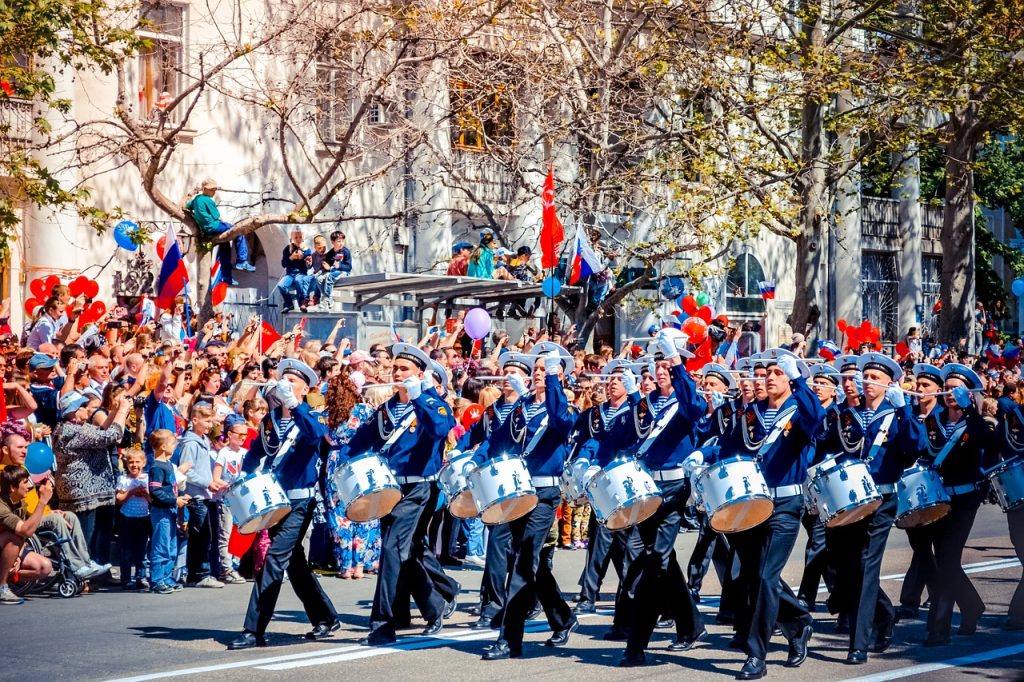Political Labels That Don’t Mean The Same Thing In Russian Posted by Maria on Oct 16, 2017 in Culture
Most of Russian political terminology is international in origin, so the words are easy to recognize: демократия, капитализм, либерализм, национализм, and so on. However, the definition of the foreign-language cognate will not always match how the corresponding word is used in Russian.
Либерализм
Либерализм may have a different connotation in Russian than “liberalism” does in English. Либерализм is defined as “Идеологи́ческое и обще́ственно-полити́ческое тече́ние, объединя́ющее сторо́нников парла́ментского стро́я, широ́ких полити́ческих свобо́д и ча́стного предпринима́тельства (An ideological and sociopolitical school of thought that unites supporters of a parliamentary system, broad political freedoms, and private entrepreneurship).”
If we look at how либерализм is used in Russian texts, we’ll see that it is closer to classical (economic) liberalism as opposed to social liberalism. The following examples from the Russian National Corpus demonstrate that.
- Либерали́зм ― э́то когда́ госуда́рство ограни́чивает своё жела́ние регули́ровать эконо́мику, позволя́я ей развива́ться на осно́ве ры́ночных зако́нов и конкуре́нции.
Liberalism is when the government limits its desire to regulate the economy letting it develop based on the laws of the market and competition.
[Сергей Алексашенко. Нет никакого особого пути // «Огонек», 2014] - Пе́рвый подхо́д, предло́женный либера́лами, предполага́ет повы́сить пенсио́нный во́зраст, отказа́ться от регуля́рной индекса́ции пе́нсий, тем са́мым сни́зив её покупа́тельную спосо́бность, и отмени́ть вы́плату пе́нсий для рабо́тающих пенсионе́ров.
The first approach suggested by the liberals calls for raising the retirement age, stopping regular indexation of pensions and thus lowering their purchasing power, and abolishing benefits for working retirees.
[Андрей Исаев, председатель комитета Госдумы по труду, социальной политике и делам ветеранов, член фракции «Единая Россия». Не менять пенсионную систему нельзя // РБК Дейли, 2012.11.26]
Правые
Russian uses the same left-right political metaphor as many other languages, but, once again, the word for “the right” (правые; plural noun that declines like an adjective) really refers to small-government, low-spending, free-market politicians rather than proponents of social conservatism.
- Пра́вые скло́нны игнори́ровать ме́рзости повседне́вного угнете́ния, ле́вые ― у́жасы револю́ций.
The right tends to ignore the indignities of everyday oppression, and the left the horrors of revolutions.
[А. Алексеев. Возвращение к фактам, или как восстановить единство истории // «Наука и жизнь», 2006] - ― Мы не ле́вые ― нам не нужна́ монопо́льная власть, но мы и не пра́вые, для кото́рых гла́вное ― э́то ры́нок (…).
“We’re not the left — we don’t need a monopoly on power, but we’re not the right, either, which worships the market.”
[Александр Братерский. Триумф воли (2003) // «Известия», 2003.06.24]
Национализм
Национализм is another concept that cannot be interpreted based on the meaning of the English word “nationalism.” Whereas in English “nationalism,” defined as “loyalty and devotion to a nation,” can be neutral or positive, the Russian word almost always carries a negative connotation.
Национализм is defined as “Идеоло́гия и поли́тика, исходя́щая из иде́й национа́льного превосхо́дства и противопоставле́ния свое́й на́ции други́м, подчиня́ющая общечелове́ческие интере́сы и це́нности национа́льным интере́сам (an ideology and policy based on the idea of national superiority and contrasting the interests of one’s nation to others that makes universal human interests and values secondary to national interests).” Perhaps национализм could be described as a combination of jingoism and chauvinism.
- Не исключа́ю, что и национали́зм во всех ви́дах ― от битья́ узбе́ков на у́лицах до борьбы́ с америка́нским влия́нием в Госду́ме ― э́то то́же плод зани́женной самооце́нки.
It could be that nationalism in all its forms, from beating up Uzbeks in the street to fighting American influence in the State Duma, also stems from low self-esteem.
[Григорий Тарасевич. Мордой о парту // «Русский репортер», 2013] - Шовини́зм и национали́зм обы́чно подпи́тывают друг дру́га.
Chauvinism and nationalism tend to feed off one another.
[Е. М. Примаков. Мир без России? К чему ведет политическая близорукость (2009)]
Have you come across any of these terms in Russian texts of conversations?

Build vocabulary, practice pronunciation, and more with Transparent Language Online. Available anytime, anywhere, on any device.







Comments:
Olena Kulikova:
Very subtly admitted! And I really like this issue! So Thank You very much. 🙂
When I was a student and tried to understand the commons of Ukrainian and Russian parliamentarian system, inherited from the USSR, I was truly puzzled with this all…
And now, after 2014, when everything here (I am from Kiev) turned upside down (or downside up ^:-)), and when I started to watch DW and get in common with the Europian and American parliamentarian system, I started to feel almost happy – for there are places in the world, where ‘right’ means ‘right’ an ‘left’ means ‘left’ 🙂
Maria:
@Olena Kulikova You’re welcome, Olena! It is definitely helpful to understand what the other person means when they use “liberal” or “conservative” in a conversation since these labels can mean different things even within the same country.